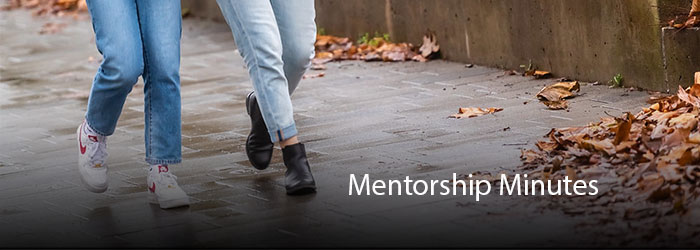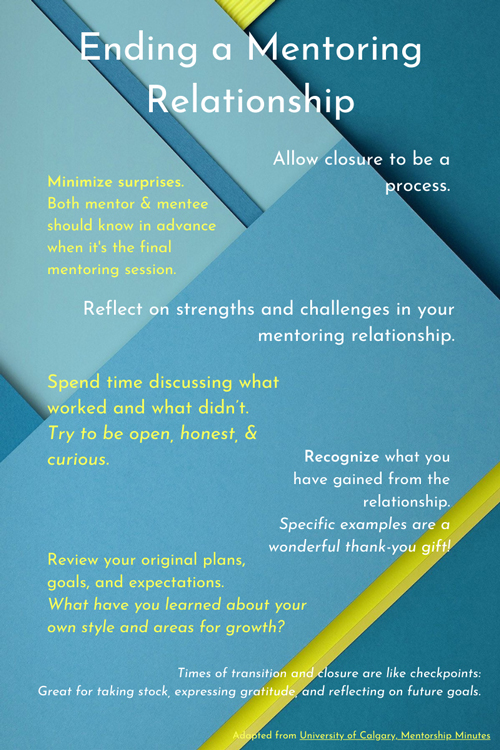 |
||||||||||||||||||
|
We are nearing the end of the pilot year of Faculty of Medicine’s Peer Mentorship Program! Thanks to all who participated. While Mentorship Minutes didn’t really get off the ground this year, I wanted to close the summer with some tips for endings and transitions in mentorship. I hope that many of you will consider participating in the Peer Mentorship Program again in 2021-2022! Sign-up for both mentors and mentees is open now, until Monday August 16. Please see this website for more information, or reach out to me at karen.ross@ubc.ca. – Dr. Karen Ross, Grad & Postdoc Wellbeing Support Coordinator, Faculty of Medicine Graduate & Postdoctoral Education Office
|
||||||||||||||||||
TRANSITIONS IN MENTORSHIP |
||||||||||||||||||
|
The pilot year of our Peer Mentorship Program was scheduled for September 2020 – August 2021. As we approach the one-year mark, it’s time to consider how to wrap up your mentoring relationship, or transition it to a new form. There are no set rules for this; it’s up to mentors and mentees to decide together how to go forward. This could look like …
In short:
In most cases, mentors/mentees will choose to wrap up their (formal) mentoring relationship. Here are some points to consider, as you do so:
Below are some useful reflection questions for mentors and mentees. Suggestion: Choose 3 (or more) questions and set aside time to answer them. Bring your reflections to the final mentoring session to discuss together.
For the final mentoring meeting, it can be nice to do something a little special …
You may also want to consider how to present this mentorship experience on your CV, and/or to reflect on specific examples for future job interviews or award submissions. Transferrable skills you could have established or strengthened throughout the year include:
In some cases, the peer mentoring relationship may not have gone the way you hoped or expected. Maybe you had trouble connecting from the start, or you weren’t able to identify clear goals, or life just got in the way. That’s okay! It can still be useful to take stock of where you are, what you’ve learned from the experience, and what you’d like to try next in terms of mentorship. If you think of anything that might have helped or improved your experience, please send your feedback to karen.ross@ubc.ca.
|
||||||||||||||||||
WHAT’S NEXT? |
||||||||||||||||||
What’s planned for mentorship in the Faculty of Medicine?Current mentors and mentees are welcome and encouraged to participate in the Peer Mentorship Program again for 2021-2022. Information and sign-up links can be found here. This year, we at the Graduate & Postdoctoral Education (GPE) Office are collaborating more closely with program-level mentorship opportunities in the Faculty of Medicine. If you’re enrolled in one of the below programs and want to be involved in mentorship next year, please get in touch with the contact listed:
You might recall that we’ve been conducting some research to help us improve this program and better understand peer mentorship among research trainees. A final survey invitation will be sent by email soon. As always, participation is appreciated but optional.
Training & Professional Development OpportunitiesIn response to your feedback, in 2021-2022 we are planning additional professional development opportunities for all peer mentors/mentees across the Faculty of Medicine. In addition to our “core” mentorship workshops (The Power of Peer Mentorship and Making the Most of Mentorship), optional training throughout the year may include: Active Listening & Asking Excellent Questions Explores communication challenges, “managing up,” and giving/receiving feedback; will include opportunities to practice via role plays & demonstrations. Resilience & Self-Care for Mentors Discuss boundaries, self-care, and knowing your limits, plus self-doubt and “imposter syndrome” in mentorship (the “what can I possibly offer this person??” feeling!). Refresher on UBC wellbeing supports & services. Models of Mentorship: Digging Deeper There are many different styles and theories of mentorship; which one fits for you? How does mentorship relate to supervision, coaching, or management? Includes troubleshooting for impasses, and ways of adjusting goals and approaches when necessary. Mentorship Across Cultures Strengthen your skills in communicating and relating to mentors/mentees with life experiences and backgrounds that differ from your own. Discussion of cultural safety (and threats to cultural safety); common challenges and how to navigate them. Transitions in Mentorship All relationships change – sometimes naturally and sometimes intentionally. Explore how to navigate the end of a mentoring term, and how to discuss preferences, expectations, and options (wrap up, continue, transition). Learn ways of seeking feedback and honouring time spent together.
Anything else?I am excited that the GPE Office is in the process of hiring a Graduate & Postdoctoral Affairs Coordinator, who will be working with the Wellbeing Support Coordinator to manage and improve our peer mentorship initiatives. We are always keen to hear your feedback, including suggestions to improve the program and other mentorship opportunities you would value. Thank you again for joining us on this mentorship experiment, and for the time and openness you shared with your mentor or mentee! |
||||||||||||||||||
|
“All life is an experiment. The more experiments you make, the better.” – Ralph Waldo Emerson |
||||||||||||||||||



